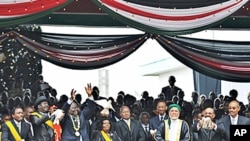International and local human rights organizations have condemned the Kenyan government for not upholding its obligation to arrest Sudanese President Omar Hassan al-Bashir. The Sudanese leader, who is wanted by the International Criminal Court on charges of war crimes and genocide, was in attendance at the historic signing of Kenya's new constitution in Nairobi.
President al-Bashir was not mentioned on the list of African heads of state expected at the constitution signing ceremony Friday.
The Kenyan government says it invited the indicted Sudanese leader to attend the event. Al-Bashir's presence at the festivities shocked and dismayed human rights organizations, who had previously urged the Kenyan government not to allow al-Bashir from entering Kenya or to arrest him if he did.
In March 2009, the International Criminal Court in The Hague issued an arrest warrant for al-Bashir for atrocities committed in Darfur in western Sudan. A second arrest warrant was issued last month on charges of genocide. Al-Bashir is the first sitting head of state ever indicted by the ICC.
A researcher for Human Rights Watch, Elizabeth Evenson says Kenya has blatantly ignored its obligation as a signatory to a statute that requires states to cooperate with the International Criminal Court, which includes the execution of arrest warrants.
"It really is an insult to the victims not only in Darfur, but to the victims of the post-election violence in Kenya because it really throws into question the commitment of the Kenyan government to accountability and to cooperating with the ICC and the investigation," Evenson said.
Last November, the ICC stepped in to investigate possible crimes against humanity committed during the ethnic violence that broke out following Kenya's disputed presidential election in December 2007. Main suspects behind the violence include prominent Cabinet members, politicians, and businessmen. The ICC opened the investigation when the Kenyan government failed to meet its own deadline to establish a local tribunal.
More than 1,000 people were killed and some 300,000 others displaced in the mayhem that threatened to break the country apart along tribal lines. The violence ended after incumbent President Mwai Kibaki and challenger Raila Odinga signed a power-sharing deal and agreed to wide-ranging reforms aimed at preventing future violence.
The executive director of the Nairobi-based International Center for Policy and Conflict, Ndung'u Wainaina, said that al-Bashir's visit demonstrates that Kenya is not ready, nor willing, to cooperate with the ICC.
The ICC has no police force and relies on 113 member states to arrest people it has indicted. The court received a major setback last month when the African Union criticized the ICC's warrant for al-Bashir and urged its members not to cooperate in his arrest.
A spokesperson for the international non-profit No Peace Without Justice, Alison Smith, tells VOA her organization is deeply concerned about the lack of commitment the Kenyan government is already showing to the ICC.
"Not a good signal they are sending at all. I guess Kenya could say that they are simply implementing this African Union decision in respect to Sudan," Smith said. "However, Kenya is a state party and if they are not cooperating with the ICC, we do have to wonder how much they are going to cooperate in respect of investigations and eventual indictments that may come out in relation to Kenya."
The African Union argues that trying to prosecute al-Bashir in The Hague jeopardizes efforts to reach a peace settlement in Darfur, where rebels have fought a seven-year war against the government in Khartoum. Critics of that argument say peace has not been possible in Darfur because there is no process of justice.
Kenyan Government Condemned Over al-Bashir Visit
